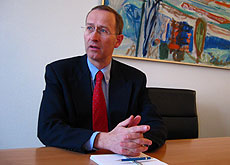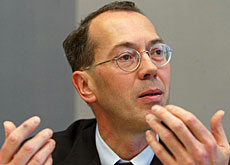“No to Schengen/Dublin would be an own goal”

Switzerland will lose out if voters reject closer ties with the European Union, according to a senior diplomat at the foreign ministry.
But Michael Ambühl told swissinfo he was confident the electorate would support the Schengen/Dublin accords governing closer cooperation on asylum and crime.
Ambühl is second in command at the Swiss foreign ministry and reports directly to Foreign Minister Micheline Calmy-Rey.
Prior to taking up his post as Switzerland’s top foreign diplomat at the beginning of February, Ambühl was in charge of the Swiss government’s Integration Office, which is responsible for negotiating accords with the EU.
He led talks on a second round of bilateral treaties with Brussels. Parliament has already signed off on the accords.
But Swiss voters will have the last word on two bilateral treaties, after opponents of closer ties with the EU collected enough signatures to force nationwide votes.
Schengen/Dublin will be put to a vote in June, while a ballot on the extension of an existing accord governing the free movement of people to include citizens from the new EU member states will go before the electorate in September.
swissinfo: What are the chances of winning support for both the EU accords being put to nationwide votes?
Michael Ambühl: I’m confident that it will be possible to convince voters of the advantages of accepting both these accords. I say this because with Schengen/Dublin and the extension of the existing accord governing the free movement of people we are talking about pragmatic solutions to things which are very much in Switzerland’s interest.
swissinfo: You were responsible for negotiating the second set of bilateral accords with Brussels. Are you satisfied with the outcome?
M.A.: I think that overall we got a good deal, particularly when it comes to Schengen/Dublin. Firstly, we managed to negotiate a solution which does not just keep but actually shores up banking secrecy.
And we have included the stipulation that if and when the EU amends the Schengen accord in future, the changes will be put out to consultation in Switzerland. This means that if it comes to a decision which would require a referendum, Swiss voters will always have the final say [on whether to continue to be part of the treaty].
swissinfo: How significant is the conclusion of this latest set of treaties with the EU?
M.A.: You could say that these accords are the logical consequence of the bilateral path [we have chosen to take]. On the one hand we have satisfied our own economic interests in areas such as finance, banking and tourism.
On the other hand we are also expanding cooperation with the EU in important political areas such as policing, asylum, education, the environment and culture.
All in all the second set of accords builds on what are already close ties with Brussels – nothing more and nothing less.
swissinfo: You are considered to be in favour of Switzerland joining the EU. But isn’t this a difficult stance to maintain in the face of considerable public scepticism about closer ties with Brussels?
M.A.: When it comes to the question of EU membership, I consider myself to be first and foremost a realist. I am convinced that for the moment the right way is the bilateral approach.
And I don’t agree that the Swiss population is fed up with talk of joining the EU. I’m more of the opinion that voters in this country – at least since 1992, when they rejected the European Economic Area Treaty – usually support proposals [relating to Europe] put forward by the government. This suggests to me that the official line on Europe enjoys wide public support.
I should also say that the question of joining the EU is simply not on the table at the moment.
swissinfo: How is the EU likely to react if the Swiss come out against the treaties?
M.A.: If Schengen/Dublin is rejected it would be Switzerland that would suffer as a result. We would lose the opportunity to cooperate on asylum with EU member states.
Our police and border guards would not have access to the Schengen Information System [on cross-border crime]… and the likelihood is that Switzerland would become more attractive as a destination for asylum seekers who have been expelled from the EU.
For Brussels, a “no” to Schengen/Dublin would not be a major problem. All that would happen is that an accord which contains a number of concessions offered to Switzerland would not come into force. In other words, Switzerland would have succeeded in scoring a massive own goal.
swissinfo: Would a “yes” vote speed up the prospect of Switzerland joining the EU?
M.A.: No. And for that matter, nor would a “no” vote. Schengen/Dublin, like other bilateral treaties, leaves all future key European policy decisions open and has no influence on any future moves [towards membership].
My personal view is that both EU sceptics and supporters of closer ties with Brussels can be happy with the bilateral accords, because these treaties put into place a framework for all the questions relating to our relationship with Switzerland’s most important [trading] partner.
swissinfo-interview: Jean-Michel Berthoud
In 1992 Swiss voters rejected the European Economic Area Treaty, a halfway house to full EU membership.
In 2002 a first set of Swiss-EU bilateral accords on trade and labour issues came into force.
A second set of nine bilateral treaties was signed last year. They include accords on police cooperation, taxation of savings, and customs fraud.
Michael Ambühl became state secretary for foreign affairs in February 2005.
He helps shape foreign-policy strategy and deputises for the foreign minister, Micheline Calmy-Rey.
From 1999 to 2005 Ambühl was head of the Swiss government’s Integration Office.

In compliance with the JTI standards
More: SWI swissinfo.ch certified by the Journalism Trust Initiative


You can find an overview of ongoing debates with our journalists here. Please join us!
If you want to start a conversation about a topic raised in this article or want to report factual errors, email us at english@swissinfo.ch.